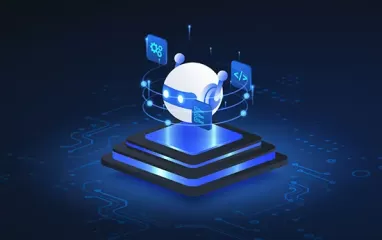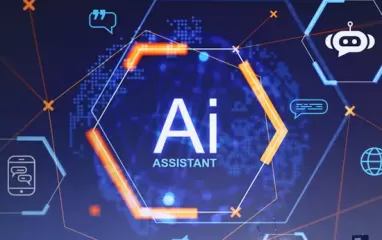Other recent blogs


Let's talk
Reach out, we'd love to hear from you!
Artificial Intelligence is witnessing a sharp transformation with autonomous) generative AI (Gen AI) agents leading the game. Traditional AI-driven models like chatbots and co-pilots lack the intelligent autonomous capabilities to complete complex tasks with minimal human dependency because of the over-reliance on predefined data. However, they are good at establishing interactions with users, synthesizing complex information in simpler tone, and generating content with greater relevance - but they feed on user prompts for everything.
This is where Agentic AI steps in as the next frontier of Gen AI solutions. As its name indicates, agentic AI has “agency” which strongly stands for the power to act independently and make necessary decisions by successful implication of autonomy. Powered by Large Language Models (LLM), and additional technologies, these intelligent agents are designed to perform with minimak human supervision by quickly breaking an assigned job down into discrete steps, execute the process, and achieve the business goals defined by humans.
No wonder, the market for Agentic AI applications and solutions is expanding rapidly. According to Grand View Research, the global AI agents market was valued at $3.86 billion in 2023 and is projected to grow at a staggering CAGR of 45.1% from 2024 to 2030. To your surprise, Deloitte suggests that by 2025, about a quarter of companies already using generative AI are expected to experiment with agentic AI through pilots or proof-of-concept projects — and that number could climb to half of them by 2027.
Let’s delve deeper into this blog and understand what is Agentic AI solutions and why everyone is in rush to rise the Agentic AI wave over GenAI while exploring potential benefits of AI-powered autonomous systems and their real-world business applications .
What makes Agentic AI applications the next big thing?
Good question! Agentic AI solutions are marvelling the ordinary GenAI capabilities and possibilities of generating text, audio, images, and video by responding intelligibly. This shift from rule-based (thought/knowledge) to decision-making (action) by strategic execution of complex and multistep workflows, can be a notable milestone for business leaders who want to stay at the edge of innovation readiness.
Interestingly, Agentic AI systems are trained to perform without constant human intervention by leveraging extremely large and varied unstructured data sets in comparison to traditional AI models, including Generative AI, that rely heavily on pre-trained data and lack the ability to dynamically interact with real-world information sources.
Chatbots and language models like ChatGPT, for example, generate responses by pulling from a static dataset or summarizing vast amounts of information from the internet. Agentic AI, however, takes AI capabilities a step further by independently assess a situation, adapting based on user needs, and execute complex tasks in real-time. This makes it a game-changer across industries where automation and real-time decision-making are critical.
Agentic AI vs Generative AI: What’s the difference?
Agentic AI and Generative AI are the two sides of one coin reflecting distinct paradigms in Artificial Intelligence dynamics, each with unique capabilities and applications.
The conversational Generative AI stands primarily for creation of relevant content, such as text, images, or music, by learning patterns from vast datasets whenever it recieves prompt from users. Models like GPT or DALL·E excel at producing human-like outputs, making them ideal for creative tasks, content generation, and conversational interfaces. However, their scope is largely reactive, responding to prompts without autonomous decision-making or goal-directed behavior.
On the other hand, Agentic AI are acknowledged as an action-oriented revolution with features of proactivity and self-sufficiency. They work independently deciding on the objectives and strategies, as well as performing actions in order to achieve them, while dealing with environments. Some of these are – In contrast to Generative AI that is content-based, Agentic AI is goal-based and exists to solve specific tasks, and think through the problems and come up with suitable strategies to solve them. Areas where these can be applied include robotics, automation of business processes, and decision-support systems.
While Generative AI shines in creativity and communication, Agentic AI offers strategic
| Aspect | Generative AI | Agentic AI |
|---|---|---|
| Core Focus | Creates content (text, images, etc.) | Takes actions and solves problems |
| How It Operates | Responds to prompts with new outputs | Plans, decides, and executes tasks |
| Examples | Writing stories, generating art | Scheduling meetings, automating workflows |
| Strengths | Fast, creative, great for brainstorming | Proactive, goal-driven, handles complex tasks |
| Weaknesses | Passive, can be inaccurate or biased | Complex to design, needs careful oversight |
reasoning and operational autonomy. The two can complement each other—Generative AI enhancing user interfaces and Agentic AI driving intelligent automation—paving the way for more integrated, versatile AI solutions in diverse domains.
Here’s a quick rundown to see agentic AI and generative AI side by side:
What value can Agentic AI solutions bring to businesses?
Agentic AI is a game-changer for businesses, bringing a human-like knack for tackling challenges on its own. One of its biggest wins is keeping companies safe as these smart AI agents don’t just sit back—they’re always on the lookout, spotting cyber threats, catching weird network behavior, and jumping in to stop trouble before it spirals.
When Agentic AI solutions step up, they make tough calls, and get things done without waiting for a human to give the green light. This means faster results, smoother operations, and the ability to grow without getting bogged down. Whether it’s streamlining tricky tasks or making smart use of resources, Agentic AI feels like a super-capable partner, helping businesses move quicker, innovate boldly, and stay ahead of the curve.
Why Agentic AI is critical for CEOs?

Agentic AI is transforming the way businesses operate by enabling faster, data-driven decision-making with minimal human intervention. Unlike traditional AI models that rely on static datasets and pre-programmed responses, Agentic AI is dynamic and autonomous, continuously adapting to real-time changes. This capability allows businesses to respond swiftly to emerging market trends, optimize workflows, and make informed decisions that drive efficiency and growth.
One of the key advantages of Agentic AI is its ability to retrieve and analyze real-time information. Instead of relying on outdated data, AI agents continuously pull live updates from various sources, including customer behavior patterns, competitor activities, and industry developments. This ensures that businesses always have access to the most current insights, allowing them to react promptly to new opportunities or potential threats. Whether it’s adjusting pricing strategies, identifying emerging consumer trends, or responding to economic fluctuations, real-time intelligence gives companies a significant competitive advantage.
Beyond gathering insights, Agentic AI enables businesses to operate autonomously, reducing the need for constant human oversight. AI-driven agents can manage complex tasks such as running marketing campaigns, adjusting strategies based on performance metrics, and optimizing internal workflows. For instance, in digital marketing, AI can analyze engagement data in real time, modify ad placements, and refine messaging to maximize conversions. In operations, AI can predict supply chain disruptions and proactively adjust inventory levels, ensuring seamless business continuity. By handling these intricate tasks independently, Agentic AI enhances efficiency while freeing up human resources for strategic decision-making.
Cost efficiency is another major benefit. By automating repetitive and data-intensive tasks, Agentic AI reduces operational expenses, minimizes human errors, and improves productivity. Companies no longer need large teams to handle administrative processes, as AI-driven automation can manage workflows with precision and speed. This not only cuts costs but also allows employees to focus on more creative and high-value tasks, driving innovation and business growth. Additionally, AI’s ability to optimize resource allocation ensures that businesses make the most of their investments, improving overall profitability.
Enhanced customer experience is another area where Agentic AI makes a significant impact. AI-powered virtual assistants and chatbots can provide instant, personalized responses to customer queries, ensuring 24/7 support and improved user satisfaction. By analyzing past interactions and customer preferences, AI agents can anticipate needs and offer proactive recommendations, creating a more engaging and seamless experience.This level of personalization helps businesses strengthen customer relationships, boost loyalty, and drive higher retention rates.
Lastly, Agentic AI enhances risk management and compliance. Businesses operating in regulated industries, such as finance and healthcare, must adhere to strict compliance standards. AI can continuously monitor transactions, detect anomalies, and flag potential security risks before they escalate. It can also ensure regulatory compliance by automatically updating processes in line with evolving laws and policies. This proactive approach to risk management minimizes legal exposure, enhances data security, and ensures that businesses operate with greater confidence and transparency.
By integrating Agentic AI into their operations, businesses can unlock unparalleled efficiency, agility, and strategic insight. Whether through real-time intelligence, autonomous decision-making, cost reduction, enhanced customer experience, or improved risk management, Agentic AI is reshaping the future of business, allowing organizations to stay ahead in an increasingly digital world.
Emerging use cases of Agentic AI

Agentic AI is already making significant inroads across various industries, transforming how businesses operate and make decisions. While still in its early stages, real-world applications are rapidly emerging, offering unprecedented levels of automation, efficiency, and intelligence. One of the most noticeable impacts is in customer service, where AI agents are redefining interactions by autonomously handling inquiries, providing personalized responses, and resolving complex issues in real-time. Unlike traditional chatbots that rely on scripted responses, Agentic AI can dynamically pull live data, analyze customer history, and adapt its approach to deliver highly tailored support, improving customer satisfaction and reducing response times.
In supply chain management, Agentic AI is helping businesses optimize logistics, track shipments, and proactively address disruptions without human intervention. AI-driven systems can monitor supplier performance, adjust inventory levels based on real-time demand fluctuations, and even predict delays caused by weather or geopolitical factors. This level of automation enables companies to maintain seamless operations, reduce costs, and enhance overall efficiency in their supply chains.
Another critical area where Agentic AI is proving invaluable is cybersecurity. With the increasing sophistication of cyber threats, businesses require AI-powered solutions that can detect anomalies, analyze vulnerabilities, and respond to security incidents in real-time. AI agents can continuously scan networks for unusual activity, flag potential breaches before they escalate, and even deploy countermeasures autonomously. This proactive approach not only strengthens an organization’s security posture but also minimizes downtime and financial losses caused by cyberattacks.
In finance and banking, Agentic AI is reshaping decision-making processes through automated trading bots, fraud detection systems, and financial risk analysis. AI-driven trading algorithms can analyze market trends, execute trades at optimal times, and adjust strategies based on evolving conditions, giving financial institutions a competitive edge. Similarly, AI-powered fraud detection systems can monitor transactions, identify suspicious patterns, and prevent fraudulent activities before they impact customers. Additionally, AI-driven risk assessment tools help banks evaluate creditworthiness, detect potential loan defaults, and optimize financial strategies with greater accuracy.
As Agentic AI continues to evolve, its applications across industries will expand further, enabling businesses to operate more efficiently, respond to challenges in real-time, and make smarter, data-driven decisions with minimal human intervention. The potential for AI agents to autonomously manage complex tasks and drive innovation is only just beginning, paving the way for a more intelligent and adaptive business landscape.
The Future of AI: Moving towards a self-sufficient digital ecosystem
As AI continues to evolve, the shift from generative AI to Agentic AI signals a move toward a more self-sufficient and autonomous digital ecosystem. No wonder organizations looking to stay ahead in an increasingly competitive landscape are rapidly embracing this transformation as a priority to improve how machines interact with data, users, and their environments.
At Kellton, we help business leaders harness the full potential of next-gen Agentic AI by developing a scalable AI ecosystem and improved their AI capabilities. With our end-to-end Agentic AI solutions, we are turning their legacy systems into a multiagent systems that are responsive, autonomous and goal-oriented. The impact we are delivering is next-level - adaptive operations, real-time decision-making and personalized customer experiences. Stay ahead of the curve with our end-to-end Agentic AI solutions. Connect with our experts today to learn how we can help in achieving new level of enterprise intelligence faster.
Important FAQs on Agentic AI systems
What is Agentic AI?
Agentic AI can be explained as autonomous AI system designed to set its goals and decide on actions guided by them independently with minimal human interference. In contrast to traditional AI, it works actively with multiple environments, reasons through complex situations and strategize various problems in order to accomplish goals, for instance, robotics and automations of work.
How is Agentic AI different from Generative AI?
AGENTIC is the most self-directed, goal-oriented, and goal-driven style of AI that set up itself to work for the given goal. Generative AI on the other hand refers to the ability of an AI to generate content such as text, images and many more in response to prompts. Agentic AI drives action; Generative AI fuels creativity.
Is Agentic AI safe to use?
Agentic AI can be safe when designed with robust safeguards, transparency, and human oversight. Its autonomy raises risks of unintended actions, so strict protocols and regular monitoring are essential. Properly implemented, it enhances security and efficiency, but misuse or poor design can pose challenges.
How does Agentic AI work?
Agentic AI is designed to analyze environments, determine proactively objectives, and navigate for the achievement of goals using such technical features as reinforcement learning and reasoning models. It involves data interpretation and the ability to learn and modify its actions and environment to achieve set goals without much intervention from humans.
What industries can benefit from Agentic AI solutions?
Some of the fields that can take advantage of Agentic AI include; healthcare sector, logistics, finance, manufacturing and cyber security. It carries out repetitive tasks, improves logistics, improves diagnostic work, identifies deception and increases safety. On account of this, its autonomy renders it useful anywhere where efficiency, flexibility, and decision-making capacity at the working level is a pre-requisite.




